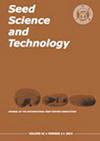特邀审查:气候变化对种子生产和质量的影响:目前的知识、影响和缓解战略
IF 3
4区 农林科学
Q2 AGRONOMY
引用次数: 0
摘要
气候变化是真实和不可避免的,不断威胁着陆地生态系统和全球粮食安全。近年来,气候变化对作物产量和环境的影响受到了广泛关注,但关于其对粮食生产基本投入的优质种子生产的影响的研究却很少。种子是作物栽培的主要种植材料,并将大多数新的农业技术带到田间。收获期和收获后的气候异常不一定会严重影响种子产量,但会降低种子的形态、生理和生化质量,最终降低田间生产性能和种子的种植价值。在我们的初步数据挖掘中,考虑了搜索结果中出现的前30个物种,在温度、CO2和干旱胁迫下,种子结实、种子产量和种子质量参数显示出不同的响应模式,这取决于子叶数量(单子叶vs双子叶)、育种系统(自花授粉vs异花授粉)、生命周期(一年生vs多年生)和成熟时间(冷月vs热月)。30种植物的相对比例表明,在炎热月份结子的双子叶和自花一年生植物中,发芽和幼苗活力受到的不利影响更大。总之,这些影响可能会降低所生产种子的数量和质量。需要立即关注并采取行动,以了解和减轻气候变化对优质种子生产和供应的有害影响。本综述总结了目前在这方面的知识,预测了未来的影响,并在预计的人口增长、气候变化和全球一级种子需求的背景下提出了一些潜在的缓解战略。本文章由计算机程序翻译,如有差异,请以英文原文为准。
Invited Review: Climate change impacts on seed production and quality: current knowledge, implications, and mitigation strategies
Climate change is real and inevitable, incessantly threatening the terrestrial ecosystem and global food security. Although the impacts of climate change on crop yield and the environment have received much attention in recent years, there are few studies on its implications for the production of high-quality seeds that provide the basic input for food production. Seeds are the primary planting material for crop cultivation and carry most new agricultural technologies to the field. Climatic abnormalities occurring at harvest and during the post-harvest stages may not always severely impact seed yield but can reduce the morphological, physiological and biochemical quality, ultimately reducing the field performance and planting value of the seed lot. In our preliminary data mining that considered the first 30 species appearing in the search results, seed setting, seed yield and seed quality parameters under temperature, CO2 and drought stresses showed differential response patterns depending on the cotyledon number (monocots vs. dicots), breeding system (self- vs. cross-pollinated), life cycle (annual vs. perennial) and maturity time (seed setting in cooler vs. hotter months). The relative proportions of the 30 species showed that germination and seedling vigour are adversely affected more in dicots and self-pollinated annual species that set seeds in hotter months. Together, these impacts can potentially reduce the quantity and quality of seeds produced. Immediate attention and action are required to understand and mitigate the detrimental impacts of climate change on the production and supply of high-quality seeds. This review summarises the current knowledge on this aspect, predicts the future implications and suggests some potential mitigation strategies in the context of projected population growth, climate change and seed requirement at the global level.
求助全文
通过发布文献求助,成功后即可免费获取论文全文。
去求助
来源期刊

Seed Science and Technology
农林科学-农艺学
CiteScore
3.00
自引率
28.60%
发文量
36
审稿时长
>36 weeks
期刊介绍:
Seed Science and Technology (SST) is an international journal featuring original papers and articles on seed quality and physiology related to seed production, harvest, processing, sampling, storage, genetic conservation, habitat regeneration, distribution and testing. A journal that meets the needs of researchers, advisers and all those involved in the improvement and technical control of seed quality. Published every April, August and December.
 求助内容:
求助内容: 应助结果提醒方式:
应助结果提醒方式:


